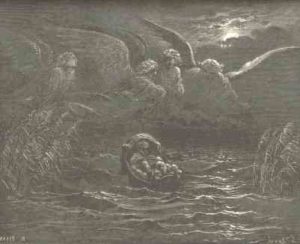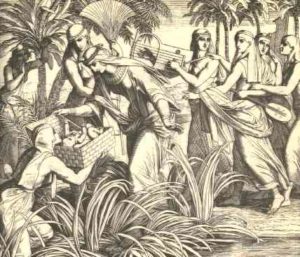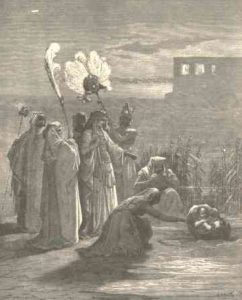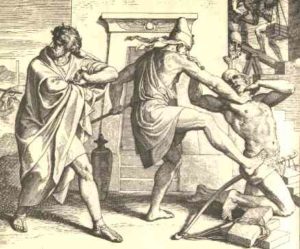Outline
Moses is born, and exposed on the river. (Verse 1-4.)
He is found, and brought up by Pharaoh’s daughter. (Verse 5-10.)
Moses slays an Egyptian, and flees to Midian. (Verse 11-15.)
Moses marries the daughter of Jethro. (Verse 16-22.)
God hears the Israelites. (Verse 23-25.)
And there went a man of the house of Levi, and took to wife a daughter of Levi.
2 And the woman conceived, and bare a son: and when she saw him that he was a goodly child, she hid him three months.
3 And when she could not longer hide him, she took for him an ark of bulrushes, and daubed it with slime and with pitch, and put the child therein; and she laid it in the flags by the river’s brink.
[bulrushes – a cattail] [flags – an aquatic plant like a reed]

4 And his sister stood afar off, to wit what would be done to him.
Moses’ mother must have thought, surely a basket floating down the river would get someone’s attention and hopefully their pity, and that they would have compassion on the child and care for him. Anything would be better than just casting him in the water to drown and be eaten by the crocodiles.
The interesting thing is that Moses’ mother ends up eventually obeying Pharaoh’s command. She did cast little Moses into the river, howbeit in a little boat.
5 And the daughter of Pharaoh came down to wash herself at the river; and her maidens walked along by the river’s side; and when she saw the ark among the flags, she sent her maid to fetch it.

6 And when she had opened it, she saw the child: and, behold, the babe wept. And she had compassion on him, and said, This is one of the Hebrews’ children.

7 Then said his sister to Pharaoh’s daughter, Shall I go and call to thee a nurse of the Hebrew women, that she may nurse the child for thee?
8 And Pharaoh’s daughter said to her, Go. And the maid went and called the child’s mother.
9 And Pharaoh’s daughter said unto her, Take this child away, and nurse it for me, and I will give thee thy wages. And the woman took the child, and nursed it.
How about that? Moses gets to live, stay with his real mother until he is weaned, which was his sister’s idea. His mother even gets paid, and Moses gets to be raised in Pharaoh’s house. That was God’s plan from the beginning. God is omniscient!
10 And the child grew, and she brought him unto Pharaoh’s daughter, and he became her son. And she called his name Moses: and she said, Because I drew him out of the water.
One of the first things that you should have noticed is that there are at least six people mentioned in this chapter and none of their names are mentioned intentionally by the holy Spirit so as to focus your attention on the main character of the book, Moses (which means “drawn out of”).
Moses’ father’s name was Amram and his mother’s name was Jochebed and since Moses is adopted by Pharaoh’s daughter, he is given the best education, and as a grandson to Pharaoh he is in a position of privilege and learns many things that would one day prepare him to lead God’s people.
Moses is a type of Christ in that he was not raised in the home of his real Father (God). Pharaoh’s daughter also received a son without having known a man. (Not by virgin birth though)
11 And it came to pass in those days, when Moses was grown, that he went out unto his brethren, and looked on their burdens: and he spied an Egyptian smiting an Hebrew, one of his brethren.

12 And he looked this way and that way, and when he saw that there was no man, he slew the Egyptian, and hid him in the sand.
13 And when he went out the second day, behold, two men of the Hebrews strove together: and he said to him that did the wrong, Wherefore smitest thou thy fellow?
14 And he said, Who made thee a prince and a judge over us? intendest thou to kill me, as thou killedst the Egyptian? And Moses feared, and said, Surely this thing is known.
[Acts 7:27,28, Acts 7:35]
Nothing is mentioned of Moses’ childhood, his teen years or his years as a young adult, just like Christ. From these verses it is not evident that Moses knew that he was an Hebrew.
When we read the words of Stephen, we find out by the holy Spirit that he definitely knew he was an Hebrew and he also knew that God wanted to use him to deliver his people. He like Christ came unto his own and his own received him not.
Acts 7:22 And Moses was learned in all the wisdom of the Egyptians, and was mighty in words and in deeds. 23 And when he was full forty years old, it came into his heart to visit his brethren the children of Israel. 24 And seeing one of them suffer wrong, he defended him, and avenged him that was oppressed, and smote the Egyptian: 25 For he supposed his brethren would have understood how that God by his hand would deliver them: but they understood not.
It appears from this that Moses knew who he was, and he was kept from his people for the most part as it would not be appropriate for a grandson of Pharaoh to be associating with slaves. Both Moses and Jesus had to wait until it was time to lead.
Hebrews 11:24 By faith Moses, when he was come to years, refused to be called the son of Pharaoh’s daughter; 25 Choosing rather to suffer affliction with the people of God, than to enjoy the pleasures of sin for a season; 26 Esteeming the reproach of Christ greater riches than the treasures in Egypt: for he had respect unto the recompence of the reward. 27 By faith he forsook Egypt, not fearing the wrath of the king: for he endured, as seeing him who is invisible.
What a powerful assessment made here by the writer of Hebrews concerning Moses, and the things that he ascribes to Moses are mind boggling.
Once Moses was a mature man, and a man of understanding, he rejected his position and its perks and chose to attempt to deliver his people.
15 Now when Pharaoh heard this thing, he sought to slay Moses. But Moses fled from the face of Pharaoh, and dwelt in the land of Midian: and he sat down by a well.
Kings sought to kill both Moses and Christ, and both had to flee into exile. Christ is still in exile today, but he will return when Israel cries out to God as they do in this story.
It is interesting how many significant people meet at a well in the Bible. Jacob and Rachel, Jesus and the Samaritan woman.
16 Now the priest of Midian had seven daughters: and they came and drew water, and filled the troughs to water their father’s flock.
[Gen 24:11, 1st Sam 9:11]
17 And the shepherds came and drove them away: but Moses stood up and helped them, and watered their flock.
[Gen 29:10]
18 And when they came to Reuel their father, he said, How is it that ye are come so soon to day?
19 And they said, An Egyptian delivered us out of the hand of the shepherds, and also drew water enough for us, and watered the flock.
20 And he said unto his daughters, And where is he? why is it that ye have left the man? call him, that he may eat bread.
21 And Moses was content to dwell with the man: and he gave Moses Zipporah his daughter.
22 And she bare him a son, and he called his name Gershom: for he said, I have been a stranger in a strange land.
Stephen adds Moses’ second son to the story, that he had in the forty years that had passed since he fled from Pharaoh. Both Moses and Christ had to go into exile.
They are eventually both accepted by their brethren the second time. Israel will believe upon Christ after his return from exile.
Moses, a Jew, receives a Gentile bride, and they become one flesh, similar to the body of Christ being made up of Jews and Gentiles into one body (the church) today (the one new man of Ephesians. Christ will go to deliver his brethren, the Jews, at the end of their four hundred and ninety years of suffering.
They did four hundred and eighty-three years before the cross, now they are in a time out prophetically speaking, and after the body of Christ is raptured out their last week of seven years will occur, then Christ will come to deliver them at that time.
This is another picture which proves the Church will not go through the tribulation period!
Acts 7:29 Then fled Moses at this saying, and was a stranger in the land of Madian, where he begat two sons.
23 And it came to pass in process of time, that the king of Egypt died: and the children of Israel sighed by reason of the bondage, and they cried, and their cry came up unto God by reason of the bondage.
24 And God heard their groaning, and God remembered his covenant with Abraham, with Isaac, and with Jacob.
[Gen 8:1, Gen 19:29, 1st Sam 1:19, Psa 105:42, Psa 136:23]
25 And God looked upon the children of Israel, and God had respect unto them.
If the king of Egypt died, that would mean that his son would be the new Pharaoh, which would be the brother of Moses’ adopted mother, his uncle.
Most likely he was Moses’ half-brother if the dead Pharaoh had only a daughter which later married as some suggest. Jesus and Moses both had half-brothers from different fathers.
The interesting thing about the Pharaoh dying is that he wanted Moses dead for killing an Egyptian and now he was dead.
His son or son-in-law was now Pharaoh and he was not aware of the situation between Moses and the previous Pharaoh which freed the way for Moses’ return to the land.
Israel will one day sigh again and cry during the time of Jacob’s trouble (Jeremiah 30:7) also known as the tribulation period and Daniel’s seventieth week, Daniel 9:24-27, and God will hear them, and the Messiah will come out of exile and save them.
Jeremiah 30:7 Alas! for that day is great, so that none is like it: it is even the time of Jacob’s trouble; but he shall be saved out of it.
Daniel 9:24 Seventy weeks are determined upon thy people and upon thy holy city, to finish the transgression, and to make an end of sins, and to make reconciliation for iniquity, and to bring in everlasting righteousness, and to seal up the vision and prophecy, and to anoint the most Holy. 25 Know therefore and understand, that from the going forth of the commandment to restore and to build Jerusalem unto the Messiah the Prince shall be seven weeks, and threescore and two weeks: the street shall be built again, and the wall, even in troublous times. 26 And after threescore and two weeks shall Messiah be cut off, but not for himself: and the people of the prince that shall come shall destroy the city and the sanctuary; and the end thereof shall be with a flood, and unto the end of the war desolations are determined. 27 And he shall confirm the covenant with many for one week: and in the midst of the week he shall cause the sacrifice and the oblation to cease, and for the overspreading of abominations he shall make it desolate, even until the consummation, and that determined shall be poured upon the desolate.
Commentary by Matthew Henry, 1710.
Verse 1-4 – Observe the order of Providence: just at the time when Pharaoh’s cruelty rose to its height by ordering the Hebrew children to be drowned, the deliverer was born. When men are contriving the ruin of the church, God is preparing for its salvation. The parents of Moses saw he was a goodly child. A lively faith can take encouragement from the least hint of the Divine favour. It is said, Hebrews 11:23,. that the parents of Moses hid him by faith; they had the promise that Israel should be preserved, which they relied upon. Faith in God’s promise quickens to the use of lawful means for obtaining mercy. Duty is ours, events are God’s. Faith in God will set us above the fear of man. At three months’ end, when they could not hide the infant any longer, they put him in an ark of bulrushes by the river’s brink, and set his sister to watch. And if the weak affection of a mother were thus careful, what shall we think of Him, whose love, whose compassion is, as himself, boundless. Moses never had a stronger protection about him, no, not when all the Israelites were round his tent in the wilderness, than now, when he lay alone, a helpless babe upon the waves. No water, no Egyptian can hurt him. When we seem most neglected and forlorn, God is most present with us.
Verse 5-10 – Come, see the place where that great man, Moses, lay, when he was a little child; it was in a bulrush basket by the river’s side. Had he been left there long, he must have perished. But Providence brings Pharaoh’s daughter to the place where this poor forlorn infant lay, and inclines her heart to pity it, which she dares do, when none else durst. God’s care of us in our infancy ought to be often mentioned by us to his praise. Pharaoh cruelly sought to destroy Israel, but his own daughter had pity on a Hebrew child, and not only so, but, without knowing it, preserved Israel’s deliverer, and provided Moses with a good nurse, even his own mother. That he should have a Hebrew nurse, the sister of Moses brought the mother into the place of a nurse. Moses was treated as the son of Pharoah’s daughter. Many who, by their birth, are obscure and poor, by surprising events of Providence, are raised high in the world, to make men know that God rules.
Verse 11-15 – Moses boldly owned the cause of God’s people. It is plain from Hebrews 11. that this was done in faith, with the full purpose of leaving the honours, wealth, and pleasures of his rank among the Egyptians. By the grace of God he was a partaker of faith in Christ, which overcomes the world. He was willing, not only to risk all, but to suffer for his sake; being assured that Israel were the people of God. By special warrant from Heaven, which makes no rule for other cases, Moses slew an Egyptian, and rescued an oppressed Israelites. Also, he tried to end a dispute between two Hebrews. The reproof Moses gave, may still be of use. May we not apply it to disputants, who, by their fierce debates, divide and weaken the Christian church? They forget that they are brethren. He that did wrong quarreled with Moses. It is a sign of guilt to be angry at reproof. Men know not what they do, nor what enemies they are to themselves, when they resist and despise faithful reproofs and reprovers. Moses might have said, if this be the spirit of the Hebrews, I will go to court again, and be the son of Pharaoh’s daughter. But we must take heed of being set against the ways and people of God, by the follies and peevishness of some persons that profess religion. Moses was obliged to flee into the land of Midian. God ordered this for wise and holy ends.
Verse 16-22 – Moses found shelter in Midian. He was ready to help Reuel’s daughters to water their flocks, although bred in learning and at court. Moses loved to be doing justice, and to act in defence of such as he saw injured, which every man ought to do, as far as it is in his power. He loved to be doing good; wherever the providence of God casts us, we should desire and try to be useful; and when we cannot do the good we would, we must be ready to do the good we can. Moses commended himself to the prince of Midian; who married one of his daughters to Moses, by whom he had a son, called Gershom, “a stranger there,” that he might keep in remembrance the land in which he had been a stranger.
Verse 23-25 – The Israelites’ bondage in Egypt continued, though the murdering of their infants did not continue. Sometimes the Lord suffers the rod of the wicked to lie very long and very heavy on the lot of the righteous. At last they began to think of God under their troubles. It is a sign that the Lord is coming towards us with deliverance, when he inclines and enables us to cry to him for it. God heard their groaning; he made it to appear that he took notice of their complaints. He remembered his covenant, of which he is ever mindful. He considered this, and not any merit of theirs. He looked upon the children of Israel. Moses looked upon them, and pitied them; but now God looked upon them, and helped them. He had respect unto them. His eyes are now fixed upon Israel, to show himself in their behalf. God is ever thus, a very present help in trouble. Take courage then, ye who, conscious of guilt and thraldom, are looking to Him for deliverance. God in Christ Jesus is also looking upon you. A call of love is joined with a promise of the Redeemer. Come unto me, all ye that labour and are heavy laden, and I will give you rest, Matthew 11:28
